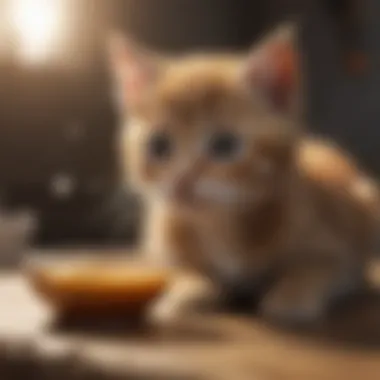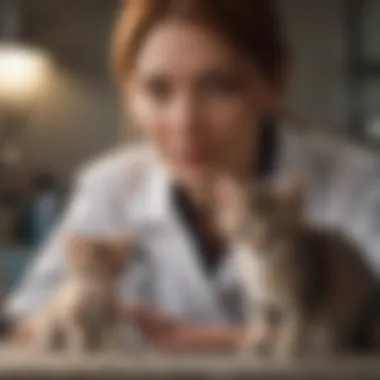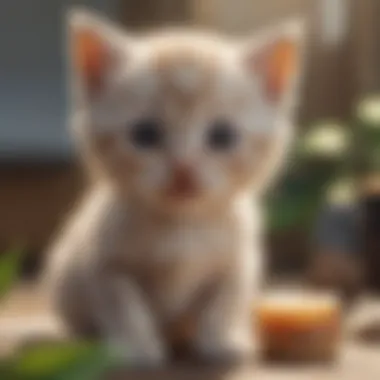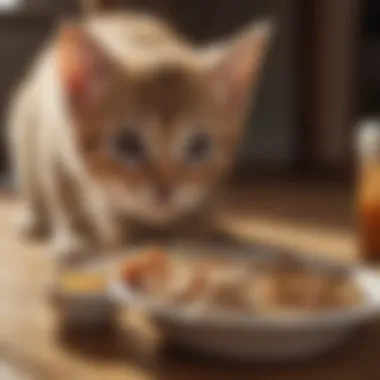Essential Feeding Strategies for Kittens with Diarrhea


Intro
Kittens are delicate creatures, and gastrointestinal issues can occur more frequently in this age group. Diarrhea in kittens can result from various factors, including dietary changes, infections, or other health issues. Understanding how to address this condition through proper feeding is crucial. This article provides essential guidelines for kitten owners, focusing on dietary management, potential causes, and the importance of timely veterinary consultation.
Animal Overview
Kittens, the youthful phase of domestic cats, possess unique physiological needs. They are not only adorable companions but also require special attention when it comes to diet, especially if they are ill.
- Common Names: Kitten, Baby Cat
- Scientific Classification: Felis catus
- Geographic Range: Domestic cats are found globally, primarily in households as they have adapted to cohabitate with humans.
Understanding the kitten's specific needs during health disturbances is the first step towards recovery.
Behavior and Social Structure
Kittens thrive in social environments. They learn from their mothers and siblings.
- Social Behavior: Kittens engage in play, which is essential for their development. This play helps them learn vital skills.
- Communication: They communicate through vocalizations, body language, and purring. These signals can reveal their comfort level with food and environment.
- Mating and Reproduction: Kittens reach sexual maturity around five months. Once matured, reproductive behaviors will emerge, but prior to this, their focus is on growth and learning in a safe setting.
Habitat and Ecosystem
Kittens primarily live in human habitats, relying on owners for sustenance and care.
- Natural Habitat: Domesticated kittens are usually found in homes as well as in shelters. Their habitats are designed for comfort and safety by their owners.
- Food Sources and Diet: A kitten’s diet should include high-quality kitten food that is rich in nutrients necessary for growth. If diarrhea occurs, special formulations may be needed.
- Role in Ecosystem: Kittens play no direct role in the ecosystem as they are domesticated. However, once they mature into adult cats, their impact on local wildlife can be significant. They can affect small animal populations and thus become part of the wider ecological balance.
Important: Pay attention to any changes in behavior or appetite; these can indicate complications from diarrhea.
In summary, kittens need proper care during illness, especially concerning their diet. Understanding their social behavior, habitat, and diet can help kitten owners provide the right support during recovery from diarrhea.
Understanding Diarrhea in Kittens
Diarrhea in kittens is not just a simple gastrointestinal issue; it can indicate a larger problem that requires careful attention. Understanding this condition is crucial for any kitten owner, as it directly affects the health and wellbeing of the animal. When a kitten experiences diarrhea, it can lead to dehydration and nutrient loss. Therefore, immediate action and knowledge about its causes and symptoms are essential for recovery.
Definition and Symptoms of Diarrhea
Diarrhea is characterized by the frequent passage of loose or watery stools. In kittens, this condition can present with various alarming signs. Symptoms may include:
- Frequent bowel movements
- Abdominal discomfort or pain
- Changes in appetite
- Lethargy or fatigue
- Vomiting in some cases
It is vital to recognize these symptoms early, as they can progress rapidly. Monitoring your kitten’s behavior and stool consistency can aid in identifying the severity of the condition.
Common Causes of Diarrhea in Kittens
There are multiple factors that can lead to diarrhea in kittens. Some common causes include:
- Dietary changes: Sudden shifts in diet can upset a kitten's delicate digestive system.
- Parasites: Intestinal parasites like worms can cause persistent diarrhea.
- Infections: Viral or bacterial infections may compromise a kitten's gastrointestinal tract.
- Stress: Environmental changes or stressors can affect gut health.
- Toxins: Exposure to harmful substances or spoiled food can also be a trigger.
Understanding these causes aids in effectively addressing the issue and preventing reoccurrences.
When to Be Concerned about Diarrhea
Recognizing when diarrhea becomes a serious problem is essential. If your kitten exhibits any of the following signs, it is crucial to seek veterinary care:


- Diarrhea lasting more than a day
- Presence of blood in the stool
- Signs of dehydration, such as excessive thirst or lethargy
- Accompanying vomiting or very low appetite
- Any sudden change in mood or behavior
The timely intervention is key. Ignoring prolonged diarrhea can lead to more significant health issues.
Monitoring your kitten regularly and knowing these signs will help provide the best care possible.
Nutritional Needs of Kittens
Feeding a sick kitten requires understanding its nutritional needs. Kittens are growing rapidly and need specific nutrients to maintain their health and aid recovery. When a kitten experiences diarrhea, it absorbs essential nutrients poorly, so a tailored diet becomes even more crucial. This section outlines fundamental nutritional requirements and hydration importance for kittens with diarrhea.
Basic Nutritional Requirements
Kittens need a balanced diet rich in several essential nutrients. These include proteins, fats, carbohydrates, vitamins, and minerals.
- Proteins: High-quality protein is vital for growth, tissue repair, and immune function. Look for animal-based protein sources like chicken or fish.
- Fats: Essential fatty acids support brain development and energy production. Healthy fat sources include fish oil or chicken fat.
- Carbohydrates: Kittens generally have higher energy needs. Digestible carbohydrates can provide quick energy but should come from wholesome sources such as rice or sweet potatoes.
- Vitamins and Minerals: Vitamins A, D, E, and B-complex, along with minerals like calcium and phosphorus, are indispensable for overall health. These nutrients support growth and development.
Focusing on these components helps ensure that a kitten's diet is both nutritious and easily digestible, which is crucial during episodes of diarrhea.
Importance of Hydration
Hydration is often overlooked but is critical for sick kittens, especially those with diarrhea. Diarrhea leads to significant fluid loss, which can result in dehydration. Therefore, encouraging fluid intake is essential. Signs of dehydration may include dry gums, lethargy, and sunken eyes.
Water is necessary for several bodily functions, including:
- Temperature Regulation: Maintaining body temperature is vital for a kitten’s health.
- Digestive Health: Adequate hydration aids digestion and nutrient absorption.
- Waste Elimination: Without enough fluids, kidney function can suffer, leading to more significant health issues.
Ensure your kitten has access to fresh water at all times. Consider providing a gentle electrolyte solution if dehydration is severe.
To summarize, understanding nutritional needs and keeping an eye on hydration are pivotal in managing both the illness and recovery of kittens with diarrhea. By providing the right balance of nutrients and ensuring adequate hydration, you help set the stage for a healthy recovery process.
Recommended Foods for Kittens with Diarrhea
Kittens experiencing diarrhea face unique challenges that necessitate specific dietary interventions. Feeding choices are crucial in facilitating recovery and supporting overall health. Selecting the right foods can help stabilize the gastrointestinal tract, replenish lost nutrients, and prevent dehydration. It is important to understand that not all foods are suitable in these circumstances. Therefore, we need to explore options that are gentle yet effective for kittens with diarrhea.
Easily Digestible Foods
When managing diarrhea in kittens, easily digestible foods are often the best initial step. These foods are designed to minimize strain on the digestive system while providing essential nutrients. Common examples of easily digestible foods include:
- Boiled chicken without skin or bones, shredded into small pieces
- Rice (preferably white) cooked until soft
- Pumpkin that can help firm up stools due to its fiber content
- Baby food that is primarily meat-based and free from additives
These choices typically have a low-fat content, which can further ease digestion. It's also advisable to introduce new foods gradually to prevent additional upset. Pay attention to the kitten’s response; if diarrhea persists, further reassessment may be needed.
Commercial Diets for Diarrhea
There are various commercially available diets formulated specifically for kittens with diarrhea. These diets often contain balanced nutrients and are designed to be easy on the stomach. Brands like Royal Canin and Hill’s Prescription Diet offer specialized options.
When selecting a commercial diet, look for:
- High digestibility: Ingredients that are easy for kittens to absorb.
- Balanced nutrition: Ensure the diet includes the necessary vitamins and minerals.
- Specialty formulas: Some are crafted with added fiber or probiotics that enhance gut health.
Always consult with a veterinarian before starting any new commercial diet. They can recommend appropriate products tailored to individual needs.
Homemade Diet Options


Creating homemade meals can be an appealing alternative. It allows for complete control over ingredients, making it easier to avoid potential allergens or irritants. Here are some basic recipes to consider:
- Chicken and Rice: Boil chicken and mix with plain, cooked rice. This combination provides protein and carbohydrates.
- Sweet Potato and Fish: Bake and mash sweet potatoes, then mix with canned tuna or salmon in water.
- Pumpkin Puree: Provide plain pumpkin puree as a standalone treat or mixed into other soft foods.
Keep the recipes simple and free of spices, salts, or added sugars. Monitoring portion size is crucial to avoid overloading the stomach. As with any homemade option, consult a vet to ensure nutritional adequacy.
Remember: Food changes should not happen abruptly. Always transition gradually to avoid further digestive stress.
In summary, managing diarrhea in kittens requires thoughtful food choices. Specific diets can facilitate a smoother recovery while delivering necessary nutrients. Keep an open line of communication with your veterinarian to ensure the best possible care and recovery plan for your kitten.
Supplements for Managing Diarrhea
When addressing the dietary needs of a kitten with diarrhea, supplements play a crucial role. They provide essential support to restore health and balance. Kittens are delicate, especially when dealing with gastrointestinal issues. Hence, understanding the right supplements can significantly aid recovery.
Probiotics and Their Benefits
Probiotics are beneficial bacteria that help regulate the gut flora. They are vital for a healthy digestive system. Kittens with diarrhea often have an imbalance in their GI tract. Probiotics can restore this balance, promoting better digestion and nutrient absorption. Assessing the type of probiotic is important. Some may focus on specific strains beneficial for a kitten’s age and health status.
When selecting a probiotic, look for brands that are specifically formulated for cats. They should provide clear information about the bacterial strains included and their respective benefits. Feeding the kitten these supplements can help reduce the duration of diarrhea and prevent recurrence.
Key Benefits of Probiotics:
- Rebalance gut flora: They help populate the gut with beneficial bacteria.
- Improve nutrient absorption: Enhanced digestion leads to better nutrient uptake.
- Strengthen the immune system: A balanced gut supports overall health.
Regularly include probiotics in a kitten's diet, especially during recovery phases. It is best to consult a vet before beginning any supplement regimen.
Electrolyte Solutions
Maintaining hydration is crucial for kittens suffering from diarrhea. Electrolyte solutions are designed to replenish lost fluids and vital minerals. They can prevent dehydration, a common concern with diarrhea.
When choosing an electrolyte solution, avoid those formulated for humans. Kitten-specific options exist. They are formulated considering the unique needs of young animals. Some may contain additional nutrients beneficial for recovery. Always ensure the solution is not overly sugary or artificially flavored.
Importance of Electrolyte Solutions:
- Prevent dehydration: Electrolyte solutions help restore lost body fluids.
- Support recovery: They provide the necessary balance of electrolytes such as sodium and potassium.
- Aid in overall digestion: Improved hydration can aid in digestive processes within the kitten's system.
Administering these solutions can be done using a syringe or adding them to food if the kitten is willing to eat. Ensure to monitor the kitten's response and consult a vet if no improvement is noted.
Remember that proper supplement use should always complement a balanced approach to feeding and hydration, ensuring optimal recovery for your kitten.
Feeding Practices during Recovery
Feeding practices during recovery from diarrhea are crucial for restoring a kitten's health. Implementing appropriate strategies can ensure that they receive the right nutrients while minimizing further digestive upset. These strategies become even more significant when considering the delicate nature of a kitten's digestive system. Adapting feeding practices appropriately not only helps in addressing current symptoms but also supports the overall recovery process.
Frequency and Portion Control
When a kitten is recovering from diarrhea, the frequency of feeding and the portion sizes need careful consideration. Smaller, more frequent meals can be beneficial compared to fewer larger ones. This approach gives the kitten's digestive system a chance to process the food without feeling overwhelmed.
- Frequency: Feed your kitten small meals approximately four to six times a day. This can help in easing the digestion process and allows them to absorb nutrients more effectively.
- Portion Control: It is essential to monitor portion sizes closely. Overfeeding, even with small meals, can lead to additional gastrointestinal distress. Use a scale or measuring cup to ensure consistent portion sizes.
By adjusting the frequency and portion sizes, you can facilitate better nutrient absorption and give the kitten time to heal.


Monitoring Progress and Adjusting Diet
As recovery progresses, closely monitoring the kitten's condition is vital. Pay attention to any changes in stool consistency and overall behavior. If diarrhea persists or worsens, dietary modifications may be necessary.
- Observation: Keep track of the kitten's stool. A transition from watery to firmer stool indicates improvement.
- Diet Adjustments: Gradually introduce new foods as the kitten starts to recover. Opt for easily digestible options before returning to a standard diet.
- Signs of Trouble: If there are signs of worsening conditions, such as lethargy or refusal to eat, it may be time to consult a veterinarian.
By staying observant and being prepared to modify the diet based on recovery signs, cat owners can ensure that the feeding practices are effectively supporting the kitten's health.
Important Note: Each kitten is unique. What works for one may not work for another. Always tailor your approach to the individual needs of your pet.
When to Consult a Veterinarian
Kittens can be fragile and sensitive, especially when facing health issues like diarrhea. Knowing when to seek veterinary assistance is crucial for their well-being. Diarrhea that lasts longer than a day or is accompanied by other concerning symptoms warrants immediate attention. A veterinarian can provide a thorough examination and may identify underlying issues that simple changes in diet alone cannot address.
One reason for prompt veterinary consultation is the risk of dehydration. Kittens are particularly vulnerable. Dehydration can escalate quickly if diarrhea persists, leading to serious health issues. Recognizing the early signs of dehydration is essential. A vet can provide necessary treatments to restore hydration levels and ensure recovery.
Furthermore, some causes of diarrhea can vary from simple dietary indiscretion to more complex health conditions, such as infections or parasitic infestations. Identifying the root cause early on can significantly aid in treatment effectiveness.
"Understanding when to contact a veterinarian can prevent further health complications in your kitten."
Whether this involves simple dietary advice or treatment for a more severe condition, consulting a veterinarian can be a pivotal step in the recovery process.
Signs that Require Veterinary Attention
It is crucial for kitten owners to recognize specific signs indicating that veterinary care is necessary during episodes of diarrhea. These indicators include:
- Prolonged Diarrhea: If diarrhea lasts for more than 24 hours, it is time to consult a vet.
- Blood in Stool: Any appearance of blood could be a signal of a serious health issue.
- Severe Vomiting: Frequent vomiting accompanying diarrhea can lead to dehydration.
- Signs of Dehydration: Look for indications such as dry mouth, lethargy, and decreased skin elasticity.
- Loss of Appetite: If the kitten refuses food for more than a day, it is concerning and should be checked by a vet.
- Fever or Unusual Behavior: Fluctuations in temperature or marked behavioral changes can indicate illness.
Observing these signs is crucial in ensuring the kitten’s health is prioritized. Not all cases of diarrhea will necessitate a visit, but vigilance is key.
Possible Diagnostic Tests
The veterinarian may employ various diagnostic tests to determine the cause of diarrhea in kittens. These tests can unveil underlying health concerns effectively. Common procedures include:
- Fecal Examination: A sample may be analyzed for parasites, bacteria, or other abnormalities.
- Blood Tests: These can reveal signs of infection, inflammation, or organ function issues.
- Imaging: X-rays or ultrasounds can help visualize internal organs and identify blockages or abnormalities.
- Urinalysis: Assessing urine can provide insights into metabolic issues or infections.
Each of these tests plays a vital role in diagnosing the specific cause of diarrhea. By proceeding with appropriate testing, veterinarians can develop a targeted treatment plan that aligns with the kitten's needs. Identifying the underlying issues promptly ensures the best chance for a swift recovery.
Preventing Future Episodes of Diarrhea
Preventing future episodes of diarrhea in kittens is essential for promoting their overall health and well-being. Recurrent diarrhea can lead to more serious health concerns, such as dehydration and nutrient deficiencies. Therefore, understanding how to address these issues through proper feeding and care practices is vital for any kitten owner. This section delves into two main areas of focus: effective feeding practices and the significance of regular veterinary check-ups.
Proper Feeding and Care Practices
Appropriate feeding practices can make a significant difference in a kitten's digestive health. It is crucial to provide a balanced diet that meets their nutritional needs while taking into account any sensitivities the kitten may have. Here are some key practices to consider:
- Choose high-quality kitten food: Select foods that are specifically formulated for kittens. Look for options that contain easily digestible ingredients and high protein content. Brands like Royal Canin or Hill's Science Diet offer diets focusing on young feline development.
- Introduce new foods gradually: When transitioning to a new diet, do so gradually over several days. Sudden changes can upset a kitten's digestive system and potentially lead to diarrhea.
- Monitor for allergies: Be aware of any unusual reactions after feeding. Signs of food allergies can include vomiting, itching, or diarrhea. If such symptoms occur, consult a veterinarian immediately.
- Provide fresh water: Hydration is essential during recovery from diarrhea. Always ensure clean and fresh water is accessible. Adding electrolyte solutions can also help rehydrate.
By adhering to these feeding practices, you can help to minimize the risk of digestive disturbances in your kitten.
Regular Veterinary Check-Ups
Regular veterinary check-ups are a cornerstone of preventative care. These visits allow for early detection of potential health issues, including recurrent diarrhea. Here’s why they are important:
- Routine health assessments: Your vet will evaluate your kitten's growth, nutrition, and overall health. They can spot issues that may lead to diarrhea before they become problematic.
- Vaccination and parasite control: Keeping a kitten's vaccinations up to date is crucial. Additionally, ensuring they are treated for parasites can help prevent gastrointestinal upset.
- Personalized advice: Each kitten is unique. A veterinarian can provide tailored guidance based on your kitten's specific needs, including dietary recommendations that suit their health status.
It is recommended that kittens see a veterinarian at least once when they are very young and follow up with regular visits as advised by the vet. This proactive approach plays an important role in maintaining their health and preventing future diarrhea episodes.
Remember, the key to preventing gastrointestinal disturbances lies in a combination of proper nutrition and regular medical care. By taking these steps, kittens can thrive and enjoy a healthier life.







